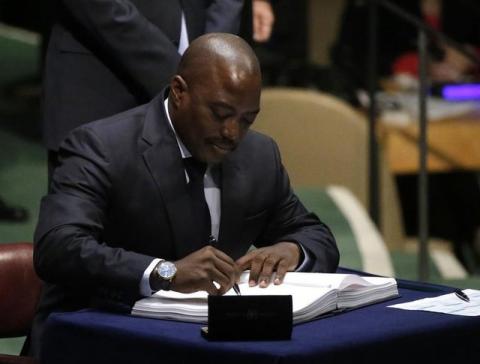Advertisement
Congo elections commission petitions high court for poll delay
KINSHASA (Reuters) - Democratic Republic of Congo's elections commission on Saturday petitioned the Constitutional Court for a postponement of presidential elections, formally confirming a poll delay that has created a dangerous political impasse.
President Joseph Kabila's term in office in Africa's top copper producer expires in December and he is barred by constitutional term limits for running again. However, the elections commission has said the overhaul of voter rolls will last until at least next July.
The opposition has accused Kabila, who came to power in 2001 following the assassination of his father, of manipulating a packed calendar of presidential, legislative and local elections to extend his rule.
His allies say, however, that he will respect the constitution.
The election period was meant to open on Sept. 20, with the presidential vote scheduled for Nov. 27.
"(Voter list revisions) being currently under way, the commission found itself faced with an impasse and referred itself to the high court concerning this," said Corneille Nangaa, the head of the elections commission - the CENI.
It did not propose a new date.
Congo has never experienced a peaceful transition of power since independence from Belgium in 1960, and protests over Kabila's perceived attempts to cling to power have led to deadly clashes with security forces on a number of occasions over the past year.
Opposition supporters clashed with police in Lubumbashi, Congo's copper mining hub, on Friday, leading to the deployment of soldiers.
Diplomats and observers fear the political crisis could trigger a repeat of civil wars that killed millions of people between 1996 and 2003.
Kabila called for talks between his allies, the opposition and Congo's civil society to discuss the elections as it became increasingly clear they would not be held on time.
This week, participants in the negotiations tentatively agreed to form an interim government that includes opposition members to govern Congo until elections can be held.
However, opposition figures involved in the talks rejected a proposal on Friday by the CENI that would have pushed the presidential vote back to the end of 2018.
"A transition of two years is unacceptable," said Vital Kamerhe, one of the leading negotiators for the opposition.
A failure to agree on a new elections timetable would likely sink the talks, whose credibility was already struggling due to a boycott by most major Congolese opposition parties. They view the negotiations as giving Kabila a chance to justify what they say is his plan to stay in power.
(Writing by Joe Bavier,; editing by Clelia Oziel)



















Add new comment